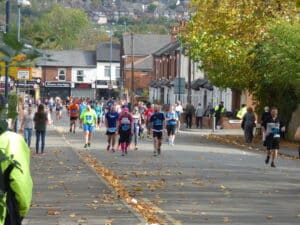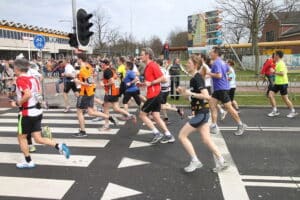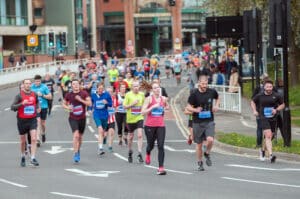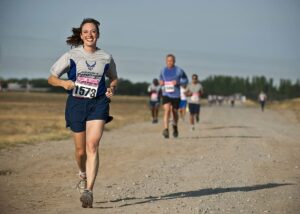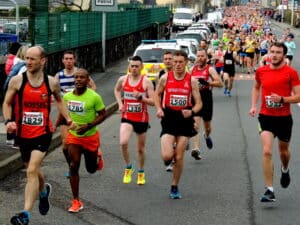The debate about how long you should rest after running a half marathon has been going on as long as people have been running. You’ll probably get an entirely different answer no matter who you ask. That’s okay though, as every single runner is different, and we all recover differently from stresses on our bodies. Every runner gives a different level of effort on race day too, which can also greatly affect recovery.
The simple answer is that everyone will recover at a different rate after their half marathon. However, for the average runner, 1 to 2 weeks should be more than enough to recover from running 21.1 km. There are many things that can greatly affect your recovery time though, so let’s go over some of them.
After running a few half marathons (whether in races or in training), you’ll figure out what works the best to get your body back to 100% as quickly as possible, and then you’ll have an accurate recovery plan going forward.
Race Day Variables That Can Affect Recovery
Before we look at the best ways to speed up recovery, let’s look at some of the different factors that can affect the level of recovery your body needs. There are a lot of different factors on race day that can affect how much your body needs to recover from a half marathon, and each will affect every runner differently.

Race Day Effort
This is a pretty obvious one, but it needs to be considered first and foremost. Obviously, the level of effort you put into race day will greatly affect your recovery. If a runner runs a 1:30 half marathon, their body is going to need a much more substantial recovery than if the same runner slows down and runs a 3:00 half marathon.
If you raced hard and ran at your aerobic threshold for most or all of the race, then your body is going to need much more recovery. Your glycogen levels will be low, your muscles will likely be sore in your lower half, and you’ll probably be fairly exhausted.
If you just casually ran at an easy pace for the race, you probably didn’t drain your glycogen stores, but you will have definitely used some of them. If you’re properly trained, you may feel a little stiff the next day, but nothing should be too sore.
Athletic Ability / Training
This is an obvious one when considering how fast to run a race, but a lot of people don’t take it into account when it comes to their recovery.
Even when giving it their all on race day, a well-trained, healthy, and in shape runner won’t experience nearly the level of stress on their bodies as an undertrained and/or out of shape runner would. For this reason, this has a huge impact on recovery.
If you are in great shape going into the race because you’ve trained properly, your body already knows how to recover from the stresses of such a long run. It isn’t nearly as much of a shock to your system as doing that distance for the first time. A well-trained athlete can probably start to train again after just a few days of recovery, albeit at a much less intense level.
An undertrained, out of shape, or just unhealthy runner will be the opposite. The stresses on their muscles, joints and even their mind can take much longer to recover from.
They also may not have the proper recovery techniques that a more experienced runner would have which will also increase their recovery time. A lot of new runners can become disinterested in running at this point because the recovery seems to “take too long.”
Elevation
If the course your half marathon is on has lots of hills, and you only trained on flat ground, this can have a huge impact on recovery times. Because you’ll be using muscles that weren’t properly exercised in training, you are going to be sore in places that you’ve never experienced before. Often, racing on a course with elevation that you haven’t trained for can lead to injury too. It is best to make sure that your training mimics the course that you’re preparing for.
Weather
Unfortunately, this is one that no runner can control, but the weather on race day can have an effect on recovery also. If the weather is much hotter than you’ve trained for, it can be hard to adjust your hydration plan on the fly, and runners often take in too little water in this scenario. The same can happen if it is colder than you trained for. Some runners find it hard to take in enough water in colder conditions because they don’t “feel thirsty” as often.
These can both make your recovery take a bit longer because your body is starting the recovery stage from a point of underhydration. This is on any good half marathon checklist so you should be well prepared for whatever weather situation you find yourself in on race day.
Methods to Speed Up Recovery
There are certain ways that you can help your body to recover faster after your half marathon. Some of them will work better than others for certain runners, so finding what works best for you can take a little bit of trial and error.
The three goals of your diet post-race are: 1) to refill your glycogen stores, which are likely depleted or very close to it; 2) to provide nutrients to help repair the damage to your muscles; and 3) to restore all the fluids and electrolytes that you lost through sweating.
Eating a Healthy, Balanced Diet
The absolute best way to help your body recover quickly and strongly after a half marathon is to fuel it with healthy, unprocessed foods. You’ll want to include lots of complex carbohydrates, good, healthy proteins, and foods that are high in healthy fats. The less processed your foods are during this time, the better.
What you fuel your body with after a run or race is what your body uses to rebuild the damaged muscle tissue. Rebuilding it with healthy foods is the best way to ensure that you recover as quickly, and as strongly as possible.
To refill your glycogen stores (which is what your body uses as a source of energy), you’ll need to take in carbs. Complex carbs are preferred, but some simple carbs are okay too. Foods like sweet potatoes, whole grains pastas, bananas, brown rice, and yogurt are all great choices. This will help bring your blood sugar levels back up to normal, pre-activity levels.
For protein, lean healthy sources of protein are best for muscle recovery. Foods such as white chicken meat, lean ground beef, beans and lentils, low-fat dairy, and fish or shellfish will all help your muscles recover not just quickly, but stronger than they were before.
Proper Hydration
Being properly hydrated is important all the time, but it is essential after a half marathon. You sweat out a lot of water during a half marathon, particularly if the weather is hot or humid.
You also lose a lot of electrolytes through your sweat, so it is important to remember to replenish them too. The easiest source is an electrolyte drink or tablet that is added to water.
Some great choices for a post-run drink, besides water, are coconut water and chocolate milk. Coconut water has sodium and potassium, which are both natural sources of electrolytes. Chocolate milk is a great choice as it has both simple and complex carbs, as well as protein to help rebuild muscle.
Stretching, Foam Rolling, Muscle Scraping, Yoga, Massage, Etc.
Stretching properly after any physical activity is important, but after a half marathon, it is paramount to a proper recovery. It can also help you avoid injuries. By stretching properly, your muscles are kept moving through their full range of motion, rather than cramping up and losing their ability to move throughout their entire range of motion.
Foam rolling, massage guns, and muscle scraping all can have similar benefits as well, helping with myofascial release.
Think of them as a mini-massage that you give yourself. For this reason, both are used quite extensively by runners of all abilities. Massages would also fall into this category of recovery.
Yoga is another form of recovery that many runners practice. It has the benefits of stretching many muscle groups in a short time, and can also help release stress and anxiety, both before and after a run.
Frequently Asked Questions
Right after your race, you want to take in a meal, snack or drink that has a combination of carbohydrates, protein, and fiber too if you can. Carbs will help top of your glycogen stores, protein will help with muscle building, and fiber will help you feel fuller for longer.
This can be a great time to use an energy drink or bar, as they are formulated to give your body precisely what it needs after a run. Using energy gels throughout your race can help you avoid draining your glycogen stores completely.
Yes and no. If you are injured after your half marathon, then you need to heal fully, no matter how long that takes. If you are just a bit sore after your race and just decide to not run for longer than the normal rest period, this is okay too! Just keep in mind that after a few weeks you will start to lose a little bit of fitness.
The general rule of thumb is to wait at least a few days, and then resume activities at 60-75% intensity to start. However, obviously, there are people who run every day (run streakers), but even they won’t bring their exertion levels back up to normal levels for at least a few days after a race.
Conclusion
Recovering after a half marathon is a very important part of any race-day strategy, and how you go about it can greatly impact how soon you can get back on your feet and training for your next race. If done properly, the benefits can be felt almost immediately and can make recovery a very simple, fast process.
If not done correctly, recovery can be a very long and drawn-out process, when it doesn’t necessarily need to be. Knowing how long to properly rest and recover after a half marathon is one of the best ways to get the most out of races, and training runs as well.
RELATED ARTICLES




